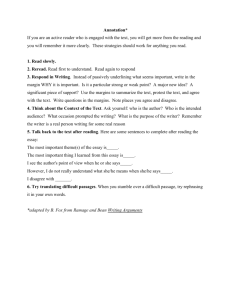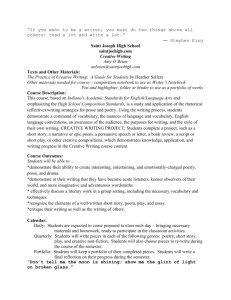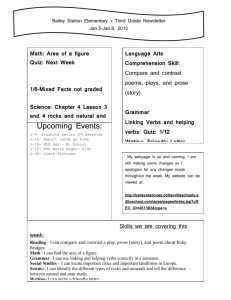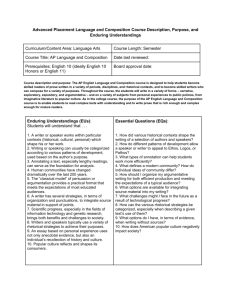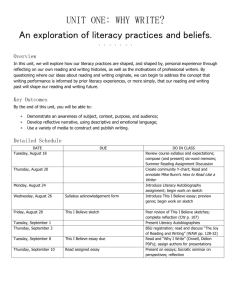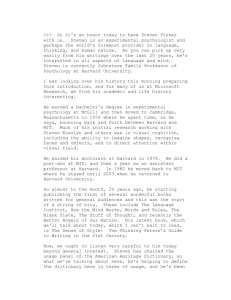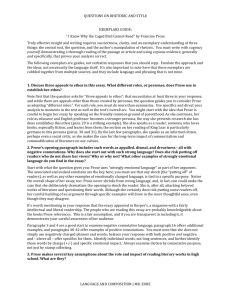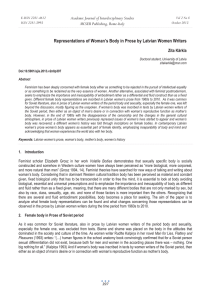Essay Writing: 'A' Student Critical Prose Style Guide
advertisement
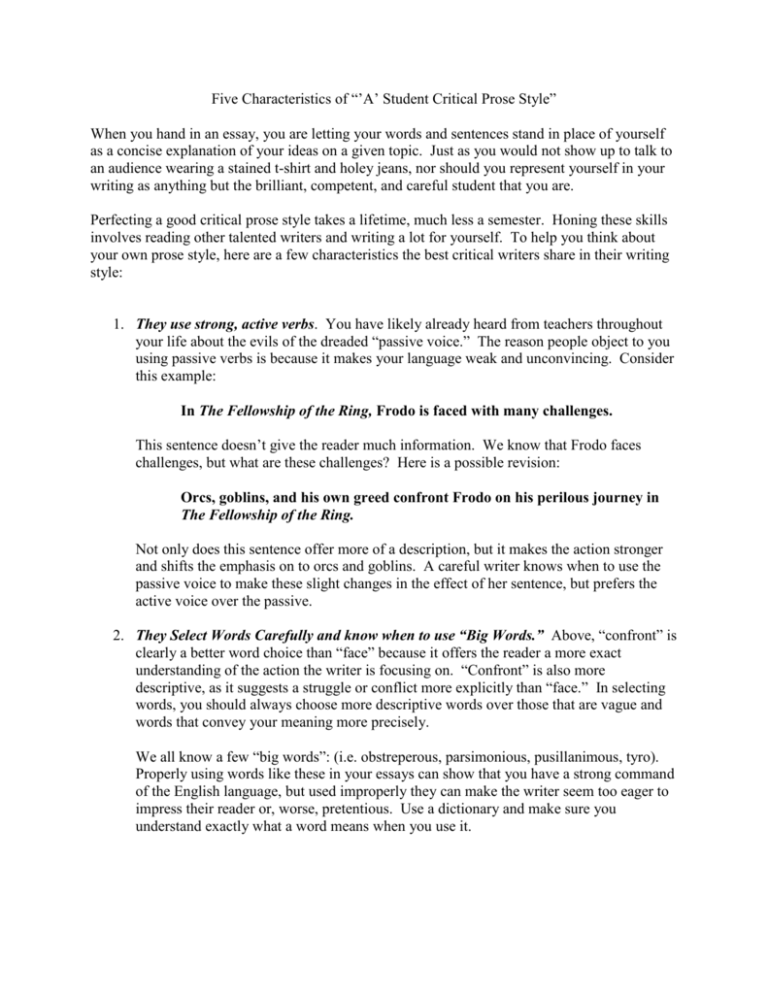
Five Characteristics of “’A’ Student Critical Prose Style” When you hand in an essay, you are letting your words and sentences stand in place of yourself as a concise explanation of your ideas on a given topic. Just as you would not show up to talk to an audience wearing a stained t-shirt and holey jeans, nor should you represent yourself in your writing as anything but the brilliant, competent, and careful student that you are. Perfecting a good critical prose style takes a lifetime, much less a semester. Honing these skills involves reading other talented writers and writing a lot for yourself. To help you think about your own prose style, here are a few characteristics the best critical writers share in their writing style: 1. They use strong, active verbs. You have likely already heard from teachers throughout your life about the evils of the dreaded “passive voice.” The reason people object to you using passive verbs is because it makes your language weak and unconvincing. Consider this example: In The Fellowship of the Ring, Frodo is faced with many challenges. This sentence doesn’t give the reader much information. We know that Frodo faces challenges, but what are these challenges? Here is a possible revision: Orcs, goblins, and his own greed confront Frodo on his perilous journey in The Fellowship of the Ring. Not only does this sentence offer more of a description, but it makes the action stronger and shifts the emphasis on to orcs and goblins. A careful writer knows when to use the passive voice to make these slight changes in the effect of her sentence, but prefers the active voice over the passive. 2. They Select Words Carefully and know when to use “Big Words.” Above, “confront” is clearly a better word choice than “face” because it offers the reader a more exact understanding of the action the writer is focusing on. “Confront” is also more descriptive, as it suggests a struggle or conflict more explicitly than “face.” In selecting words, you should always choose more descriptive words over those that are vague and words that convey your meaning more precisely. We all know a few “big words”: (i.e. obstreperous, parsimonious, pusillanimous, tyro). Properly using words like these in your essays can show that you have a strong command of the English language, but used improperly they can make the writer seem too eager to impress their reader or, worse, pretentious. Use a dictionary and make sure you understand exactly what a word means when you use it. 3. They Limit their use of “to be verbs.” Forms of the verb “to be” are certainly a staple of any writer’s vocabulary (take this sentence, for instance). But used in excess, “is,” “are,” “was,” “will be,” etc. can become repetitive and weaken your writing. 4. They know the right time to use “I.” Many high school students are forbidden from using the first person singular subject position (The “I”) in their formal writing. Teachers usually make this rule because properly using “I” in formal writing is quite difficult. Use it too much and you risk sounding casual and not very serious about your subject matter; use it not at all and your essay can sound impersonal, uninteresting, and sometimes awkward (One might believe that the one writing this essay thinks that…). Introductions and conclusions can be effective places to insert your own “voice,” but you shouldn’t be afraid to experiment and find your own style. 5. They avoid excessive use of emphasis words. In our everyday speech, we use words like “really” and “very” to add emphasis to our speech. When these words appear in our formal writing, though, they look very out of place and make our writing seem totally informal. 6. They understand the appropriate “voice” for a formal essay. Knowing your audience is important for any writing that you do. You wouldn’t write to a friend in an e-mail in the same way you would write to the President of the United States (hopefully!). Likewise, be sure that you are using vocabulary, punctuation, sentence structure, and a “tone” that is appropriate for a formal critical essay. 7. Above all, their prose is idiosyncratic and interesting. A person’s prose style is as unique to them as is their personality or facial features. It is an amalgamation of the different writers they have read, the different teachers they have worked with, their own talents as a writer, and their own wit and insight. They bring this all together to make a style of writing that is pleasurable to read; writing that both reveals something about themselves and the matter they are writing on.
